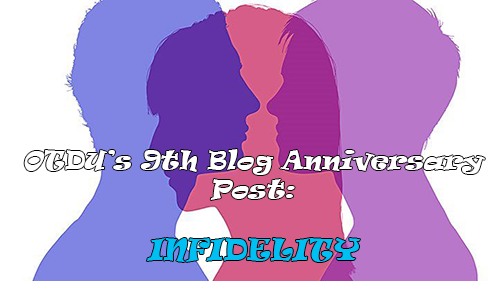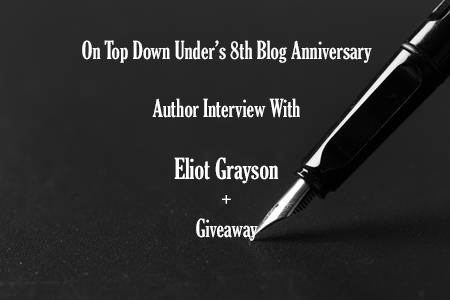9th Blog Anniversary Post: Infidelity

I’ll start by saying that this is not intended as relationship or personal counselling advice, it’s an informational post about some things I’ve learned over the years as a therapist. If you are having marital problems, if there has been infidelity, see a therapist to assist your own unique relationship and set of circumstances. I would suggest someone who specialises in relationships and is a sex therapist because they’re more likely to be able to help with infidelity and less likely to have issues of countertransference. Check out associations in your country, or websites in your local area. The therapist’s site should tell you their areas of speciality.
I decided to write this post for our 9th blog anniversary because I read in the romance genre. I’ve been reading romance for about 10 years now. During this time I don’t believe I’ve run across anything that engenders such intense reader reaction as infidelity, or “cheating.” I’m used to infidelity professionally, and I make no particular judgement either way about it, but I definitely know now when I review books where there is cheating, or it skates close to that line, it’s best for me to add a trigger warning about the content for fellow readers. I’ve noticed what a number of readers who are upset by cheating react to, and while the points below aren’t exhaustive and may seem similar, there are nuanced differences here-
- When an MC has sex with someone else on page – can be prior to meeting the other (predestined) MC, prior to committing to them, or even during a break-up period.
- If the MCs are in a relationship and someone else is floating around the MCs in an intimate way, if there’s a close call or ‘nearly sex,’ it can become quite contentious.
- Even if an MC at some stage tells the other (predestined) MC, “no, nope, not interested, not happening, absolutely no way” and they do have some connection or intimacy with another character, that can be seen as quite problematic.
- When a series suddenly has one of the MCs having sex with another character, someone who is not their partner, especially when it’s a beloved couple, this can definitely cause heartache.
- Physical cheating itself is an utter no-no.
And if you’re wondering why I feel I need to add a trigger warning to my reviews, well, I believe in them. I see the effects of triggers. I also understand different triggers upset different readers, and as an avid reader, I know how it feels to love characters at a soul-deep level, to care for them like they’re real people, and we all have our own hard limits. An example that springs to mind about the ire that infidelity raises is the very well read and reviewed Bareback, by Chris Owen. The readers who don’t like the book overwhelmingly ‘hate’ Tor, one of the MCs. They ‘hate’ him for cheating, and Jake can be disliked, or shamed, for taking him back. The reaction of romance readers is simply a microcosm of the wider community when it comes to infidelity. It’s not unusual for me to field DMs or emails from fellow readers to further clarify certain things in my reviews regarding (potential) cheating, or whether they feel they might be able to read/not read a book. Which I’ll always discuss.
Below is a list of some of the most popular books containing infidelity or cheating for those of you who are interested…or for those who would like to steer well clear. The first link is for gay romance – mm – the second for het romance.
https://www.romance.io/topics/best/m-m,cheating/1
https://www.goodreads.com/shelf/show/cheating-romance
Affairs/cheating/infidelity, whatever name you prefer, is an emotive topic because we see it as the ultimate betrayal. Society labels it as such. Some cultures, family, friends, print media, and online/social media weigh in heavily. No matter what, it certainly causes hurt, strong emotion, opinion. Sex is a taboo topic at the best of times, and infidelity raises complex questions about ourselves, our partner, our relationship with one another, and it raises trust issues that possibly didn’t exist before. Although, to be honest, there may have already been a few trust issues in your relationship. Trust is not just about monogamy or infidelity.
betrayal. Society labels it as such. Some cultures, family, friends, print media, and online/social media weigh in heavily. No matter what, it certainly causes hurt, strong emotion, opinion. Sex is a taboo topic at the best of times, and infidelity raises complex questions about ourselves, our partner, our relationship with one another, and it raises trust issues that possibly didn’t exist before. Although, to be honest, there may have already been a few trust issues in your relationship. Trust is not just about monogamy or infidelity.
No matter how it’s broken, when trust becomes problematic in our relationship it’s to the fore of our minds and it takes time to find emotional equilibrium again. How long it takes to get on top of the initial pain, the secondary hurt, the relegation of the pain and hurt into something else, something settled well and truly into the background, depends on the people within the primary relationship. Then there’s how much capacity someone has to forgive or to be accountable. Not everyone has to forgive, just for the record, because some people can’t, and they shouldn’t feel wrong or be shamed if that’s the case. However, for those wishing to rebuild, accountability is essential.
And some pertinent questions are, how long has the couple been together? How much love is in the relationship in the first place? Because the relationship may have been limping along and withering for some time. Do the couple seek out professional assistance? Because good therapy helps. And after something hurtful happens to us we become hyperaware. When it’s infidelity, now we notice all the cheating in movies, books, songs, and it feels like they’re shouting loudly at us, or sending an arrow straight to the heart, reopening the wound, and our hurt is magnified. If this is currently causing problems for you, vet the movies, the music, the stories you watch, listen to and read for a while. It will pass.
It’s also not unusual for people to advise friends, and anyone else who will listen, to kick someone out if they cheat. Once divorce was the shame (unpleasant times) now staying and trying to make it work is the more contemporary shame (also unpleasant.) Believe me, having other people’s voices in your head, especially when you have a lot of your own thoughts spinning around, and your own decisions to make, confuses you immensely. People’s advice can be well-meaning but if it comes from a place of moral superiority, it isn’t going to be helpful at all. It can actually ingrain more shame, and for the Hurt Partner their partner having been unfaithful can already have stirred up feelings of shame. Sometimes friends become very judgemental about you, your relationship. Know that you have the capacity to make decisions for yourself, for your relationship, for your life. This is why I suggest people only disclose to a select few non-judgemental friends. Maybe a family member… with a caveat attached. Sometimes, when you disclose to family and you want to get back with or stay with your partner, they can make it very difficult. They may not forgive your partner. But at the end of the day this is your decision to make, not theirs. It can become quite complicated now if family disapprove when there are birthdays and holidays and family get-togethers to navigate. Parents or siblings, once they know the details, can judge quite vociferously. And just because they’re your family doesn’t necessarily mean they’re looking out for you.
Also, it’s not unheard of for families to show minimal support to their adult child(ren.) There’s phrases such as, “you made your bed, now lie in it,” a common phrase not that many years ago and still used. This isn’t helpful or productive. Support is important, it just needs to be balanced. This is why I believe wholeheartedly that talking to a professional, independent third party, working through your own feelings, seeing what you and your partner can sort out together, and doing some significant reflection about what you personally want, feel, and desire, and why that is – personal awareness, self-differentiation – is the very best thing anyone can do for their relational life. And when I use the word relational I’m talking about you as well as any other relationships you have – your partner, your family, etc. It’s an absolute truth that quite a few people don’t know who they are. You can’t ask for what you want if you don’t know what that is. If you don’t know who you are or you don’t believe in yourself, you’ll certainly struggle requesting things, let alone setting any boundaries.
And pre-affair, if not pre then at least post, mull over the following – affairs are a fantasy, you don’t live your real life with the Affair Partner. You only get the good parts. You don’t change nappies, worry about the mortgage, pay the rent, look after a sick partner, raise children, pay bills with them, etc.
Why do people hate infidelity or cheating so much?
Apart from what I’ve already covered, plenty of people have been impacted by infidelity, directly or indirectly. Directly, it’s happened to you. Indirectly, maybe one of your parents cheated on the other and at that time you felt divided and in pain. Many people can empathise with what it might feel like to be cheated on as well, and they don’t like that idea one iota. And cheating, affairs, infidelity can definitely be a trauma, and I’m neither overdramatising or making light of trauma, I work with trauma every day. Infidelity can make us define ourselves in terrible ways; we ‘must have something wrong with us’ – we’ve gained weight recently, we’re not having sex as much as our partner wants – a topic for another time – or we’re simply “broken” somehow if our partner looked elsewhere. If this is not the first partner who has done this to you, it creates distressing mental or subconscious cues. Thinking like this is ‘all on you’ suddenly makes you the entire reason for someone else’s decisions and actions, which is unfair. Add to this your confused thoughts and resentment, and you feel it all weighing you down and keeping you awake at night.
The thing is, cheating often has more to do with the Involved Partner, or the person who had the affair, than you. I’m not saying that there aren’t other things in a relationship that carry a lot of weight, weight that can be equal to or greater than infidelity. Just for the record, people give me side-eye or react strongly when I mention this. However, when we think mindfully about things, we might have been doing some damage of our own to the psychological security bubble we once constructed together, even prior to our partner’s infidelity. When we reflect on it, maybe we haven’t helped when it comes to the relationship disconnect in some way, which doesn’t have to be the case, but it’s possible. This is where it depends on the people in the couple. This is where I mention being self-aware, but don’t use this to blame or to beat up on yourself. Don’t use this to excuse someone or to let someone out of being personally accountable either. But blame gets you exactly nowhere. Use this moment to be empathetic and to take on your part for moving forward, whatever direction that may be. It helps to remember that absolutely no one person is perfect.
But hang on there, Kazza. Back up. Society, our friends contend that affairs are the singularly biggest destroyer of a relationship and trust, so what are you saying? I’m saying that’s a bit of a fallacy, and I’m certainly not excusing an affair. What I am saying, though, is think spousal/partner violence or abuse, both damaging and dangerous, or partner control and contempt, both hurtful and eminently disconnecting. And when so many partners choose to stay after infidelity, why is that?
Well, love is a powerful thing. The history we have created together is potent, the life we have built, the family, the memories. The friendship with our partner as well. These things are not so easily made disposable or simply ‘logic-ed’ away. They are all deeply emotional factors. And the character of our partner is another largely determining factor too – they’re a good parent, and outside of having an affair or a one night stand, etc, they have been a good partner. Overall, is this out of character for them? Or is this somewhat pathological? These things, along with who we are and what we want, help make a lot of determinations about ‘stay or leave’.
I primarily speak about three types of affairs – the whys – with people who are dealing with infidelity, different therapists have their own take. This is a very stripped down version for a blog post to make people talk or think –
- Relational/Emotional: acting out in reaction to primary relationship issues. Generally a person is feeling disconnected because their partner has been an absentee or difficult partner for some time, constantly non-communicative – both talking and listening. Perhaps (they have felt) their partner has been contemptuous toward them, perhaps long-standing emotionally dismissive.
- Personality/Characterological: acting out of selfishness/narcissism and/or immaturity. A sense of entitlement appears all pervasive with this affair type and this partner. Multi-affairs over years. Little to no accountability is found around this type of affair.
- Existential: where the primary relationship is seemingly healthy and loving, but suddenly a person feels that life is short and wants to experience more… for various reasons. Perhaps there has been a difficult health diagnosis, someone close to this person has died, they have a child with a chronic illness, or they’ve aged and hit a point where they are thinking, ‘is this all there is to life?’
Male vs Female Reactions:
Without lumping everyone together, because there are always exceptions, I’ve found in practice that what upsets men the most about their partner’s infidelity is inline with the sexual act itself – ‘what did my partner do sexually with the other person? Was it a blowjob or oral? Did they have sex in different positions? Were they more physically attracted to them, more sexually demonstrative? Did they like the sex more? They don’t act like that with me or they won’t do those things with me (anymore.)’ What I find upsets women more is the emotional, the connected – ‘was my partner more romantic with the Affair Partner? More attentive? Did they tell them they are beautiful? Did they communicate with them when they don’t with me (anymore?) Did they talk about me and our relationship with the Affair Partner?’ Or two big ones – ‘did they tell them they love them? Did they say that they would leave me for them?’ Just an added tip for the last two, unfaithful partners will quite frequently say something that they don’t often mean during an infidelity, for various reasons. Universally male or female, if you were unfaithful with your partner’s best friend or a family member, this causes a deeper layer of complexity no matter the gender.
How do we recover?
The rate at which we recover is up to the individual, the people within the primary relationship. No matter what, it takes time. It will depend on how deeply entrenched the belief of monogamy lies within. It depends on the Hurt Partner’s connection with the Involved Partner, the one who had the infidelity, and what they want. The Involved Partner’s willingness to be transparent and be accountable. How big the infidelity was – was it years? Did they create or parent a child with the Affair Partner during a lengthy or even shorter affair? Did the Involved Partner keep going back to the Affair Partner? Did the Involved Partner then continue to lie about it? The age of the partners has quite a bit to do with it. And did your partner gaslight you? Or yell at you, “how dare you accuse me of an affair! What’s wrong with you? I would never!” And, are there numerous infidelities or one?
The Involved Partner, the one who was unfaithful, shouldn’t give sound bites of information about the infidelity because they’re nervous about what their partner will think, or it’s too embarrassing to hear out loud. It’s too late for that now. Now is the time for honesty. Table pertinent information quickly, and answer questions truthfully, don’t leave it up to your partner to have to find extra details out from other sources. We live in a digital age, trust me, everything can be found. Be open and honest. Don’t dance around the truth, otherwise your partner will have growing problems trusting you. The worst thing that can happen is you lie initially, and, to be frank, pretty much everyone does when first confronted about infidelity – to protect themselves, to protect their partner – but then, the bigger issue is whether you continue to lie after. It’s also hugely problematic when the Involved Partner says ‘it’s over’ when it isn’t. This creates large obstacles. Now, you not only have a partner who is hurting, but you have a partner who will find it increasingly difficult to believe another thing you have to say. This leads to anger and deeper, harder to budge resentment.
- It helps the Hurt Partner to ask personally productive questions – ‘why did this happen? How did this start? What did you get there, with them, that you couldn’t get here, with me? Is this well and truly over?’ See what hangs together for you, what seems genuine. And for the Involved Partner, the one who had the infidelity, ‘I don’t know’ repeated over and over isn’t an answer.
- The Involved, or the unfaithful partner’s accountability is also incredibly significant. If you cheated on your partner, own what you’ve done. Don’t add a “but” to your sentence, the whole ‘I know I did the wrong thing… BUT’ – eg; “I’m sorry I did this… but if you’d had more sex with me I wouldn’t have….” No, no, no. This is not accountability, it’s blame and deflection. If you want to remain in your primary relationship, do all you can to let your partner know how much they mean to you and that you feel regret for the hurt you’ve brought to the relationship. Show your partner you absolutely want to create a stronger, better partnership with them. And, if your partner wants to talk about the infidelity, I don’t recommend the following – “you just need to get over it, I have.” Or, “I don’t want to discuss it anymore!” But no one should become a punching bag and no one should stay in a position of being a victim either. It can happen, I see it, and neither is healthy or helpful.
- The Involved Partner needs to find and develop better coping strategies. Infidelity isn’t a a good coping mechanism. It raises more complications and contradictions in your life and your relationship. Become familiar with better coping skills, such as gratitude, solid communication, healthy hobbies, fun with your partner, your nuclear family. Have a date night with your partner. Become involved with your family (again.)
- Make and set some boundaries. We need to make sure we learn how to not collapse in on ourselves about what we want and need. I tell the Hurt Partner, so that they don’t feel like they are are caving in on something so significant to them, that they need to start setting clear boundaries that may sound a little like, ‘okay, I’m prepared to work through this major lapse in judgement, and while we have to fix us, I won’t tolerate it again.’ This is not an unreasonable boundary but any boundary you set you must believe in. Don’t say things that you can’t or won’t back up.
- Know who you are and where you’re at. I ask what discussions people had about monogamy/infidelity in the beginning of their relationship. Some people believe monogamy is a given, so they don’t discuss what they feel is implied. You really do need to discuss it prior to full commitment. I tend to find that most of the monogamy “discussions” go like this – “If you ever cheat on me, your bags will be packed and waiting for you at the front door! Your clothes will be in a wet pile on the lawn! Your things will be a smouldering mess out front!” Well, this is not a boundary discussion this is more an ultimatum speech, and often one where the other person is possibly not listening. And, with this type of “discussion,” if we are the Hurt Partner in the two thirds, the people who decide to stay, we feel “weak” and like we’re backed into a corner, then we beat up on ourselves because we stayed to work this out, not drowned clothing, or packed our partner’s bags. Don’t have a relationship based on poor communication and a lack of clear boundaries. I know some people are uncertain about what constitutes a boundary, as opposed to, say, control, a therapist will be able to help you.
- Get help and work through a program with the right therapist. Make a concerted effort to improve your overall relationship, not just solely infidelity work. It will help you with much needed decision-making if you can think relationally, with awareness of not just yourself but your partner – the “us” in the relationship, not the “me.” Therapy will help you make decisions and perhaps stay and have a newer relationship that is a more open, honest one, or you leave because you categorically know you can’t do this. No matter the outcome, it’s good to have clear direction. And these decisions will be yours, you will make them, not your friends or family or some YouTube site, because a therapist isn’t going to tell you to stay or leave, like other people may be inclined to do, they’re going to give you professional guidance to assist you in your relationship and your choices.
- Engage empathy: Empathy is critical for everything relational. I like both of the following because they’re both sound.
–If I wouldn’t like this done to me, then I won’t do it to my partner, and
–If this is something I would not or could not say or do in front of my partner, then I won’t say it or do it. - Productive, positive communication is good: Looking forward to the things you’d like to do. Speaking up about what’s important. Finding support and surrounding yourself with close friends, doing things that make you feel good, that make you feel happy in the here and now. Definitely not doing anything that further complicates your life, like using retaliatory infidelity as self-righteous payback. It’s a human reaction, but often something quite limbic, it’s an emotional kneejerk – “I’ll make you hurt as badly as you’ve made me hurt.” You don’t make someone more accountable or empathetic by hurting them. It’s counterproductive. Passive-aggressive relationships get immense traction out of retaliation and the relationship quickly devolves into the maladaptive.
- I do believe that out of the disorder a new order can emerge: Both you and your relationship can get the assistance needed to move forward in a way that looks and feels good to you. This is true of any reason people seek therapy – to make themselves, or their relationships, stronger. To have the resources they’ve never had before, and now, perhaps, there’s a catalyst to learn how to change behaviours for the better. Anything that helps you adapt and makes you feel comfortable, not what other people want or expect of you, what you want for yourself, is a good thing.
There is so much more I could talk about – open relationships also have problems with infidelity, polyamorous ones too, and bringing in a third and the issues that can occur when guidelines are not set around that are real – but this is a general overview on a book review blog. And I’ll finish how I started, this post is absolutely not meant to replace talking to a professional yourself.
~~~
Now I’ve added my blog two cents worth, below is a link to an excellent TED Talk by the ever-knowledgeable Esther Perel. If you are interested in hearing an expert and a wonderful speaker sum up infidelity in a contemporary and enlightening way, I believe it’s 20 minutes well spent.











Excellent post. It’s a very “interesting” and important topic. Esther Perel’s talk was the icing upon the cake. Thank you, Karen, for all your hard work. I’m looking forward to your next post.
Thank you for your kind words, John. <3. I don't believe I'll be writing another post like this for this blog but it was good to add it for our 9th blog anniversary.
Oh yes, Esther Perel is both dynamic and knowledgeable. Anyone interested in her can subscribe to her site - http://www.estherperel.com
I had a boyfriend cheat on me when I was younger and what you said about it being traumatic is totally true. I eventually got past it but was judging new partners based on the old one so I saw a psychologist and that helped me. I have a great hubby now and a happy life.
I love your post. It was so informational. Please do some more?
Thanks for sharing, Debbie. It’s good to hear you say that post infidelity you were proactive and positive. I also love hearing your relationship with your husband is so happy 🙂 🙂
What a great, informative, post, Kazza. I have very strong views on infidelity (as you know) because of what my sisters and I watched with my parents. It really screwed us up a lot because my dad was very open about his affairs. He would brag about them, and the women often called our house to talk to him. He would have long conversations with the women while we (and our mom) were in the room. I was very young, but I remember it well. Those are the only memories I have of when my mom and dad were still together. Needless to say, that caused us (my sisters and me) to have serious trust issues.
One thing you said that really stood out for me… be careful who you discuss things with, who you trust. We’ve always told our sons that it doesn’t matter how good your partner is, people will forget all the good things if you share one bad thing. Suddenly, the bad thing is all they’ll remember. And sometimes friends aren’t really friends at all.
Again, great post. I haven’t watched the TED talk yet, but I will.
What you and your sisters witnessed was devastating and something you don’t forget. That your dad could be so disrespectful, hurtful, and entitled, not the least bit mindful of being a parent and the responsibility of that, the consequences. That your mum didn’t shelter you girls better as an adult, such a boundary issue. It was all toxic. Being the age that I am, I know that time well, it was an era where females equalled second class citizens and excuses were made for men. It was a shocking dynamic. You don’t even have to wonder why trust was such an issue for you all as you grew up.
It is so true what you said, so true – one bad thing and it sticks. It’s like the pristine whiteboard with a microscopic black dot and all someone can see when they look at it is something defective.
It was interesting writing this for a book review blog. But I thought, why not? I can tie it in. But it also rams home to me that there is so much more complexity to the topic than I can write about in one post.
Thanks, Cindi
What a thought provoking post! Thank you, Karen.
Thank you for your kind words, Kareni
Thank you for this awesome relationship post.
Thanks, Sara 🙂
Thanks for this great post, Karen. It really got me thinking about a lot of things from my own life in a new way.
I think it’s true that society really tends to see infidelity as a “burn it to the ground” end to a relationship, a betrayal without nuance or excuse.
My father once confided in me that he’d cheat on my mother because he “no longer saw her as a partner” and thought she didn’t “strive to please him” like a younger, more appreciative woman. I’m still pissed at him to this day. Maybe I shouldn’t have, but I ended up telling my mother what he said, and she wrote it off, saying that she had an affair with a man who offered her support after my brother committed suicide. I wasn’t even mad at her.
Every therapist I’ve ever had asked me why I hate my father so much for what he said and tried to make me feel as though it’s the same betrayal—cheating is cheating, after all. I always tried to articulate that I didn’t think that was the case, that my mother’s desire for comfort after the death of her son was fundamentally different from throwing your wife aside for someone more “appreciative” and attractive.
None of my therapists ever allowed me to make any distinction. I like this post because I think it does allow for that.
Thank you for your support of the blog post, Jackee. Much appreciated. And yes, infidelity can be incredibly nuanced. One size most definitely doesn’t fit all.
I’m so sorry that you’ve felt placed in an emotionally limiting box. I’ve been there too with therapy of my own. It isn’t that easy, and it isn’t okay to make clients feel like that. By the sounds of it, at a superficial level, your father visualised or fantasised, while your mother actualised. So, at an objective level you could say your mother cheated and your father only gave thought to cheating but didn’t follow through. “So, hey, what’s your problem? Why are you placing the concept at different levels anyway?” However, it’s much more complicated than that. You can’t place your relationship with your parents, theirs with you, in an objective box. It doesn’t work that way. These are all individually subjective, deep-seated, powerful thoughts and emotions and feelings and behaviours at play – eg, your brother’s death, your father telling his daughter personal, sexually based desires, it conflicted you and felt like a huge betrayal. Then your mother also gave you more sexually based information than she should have, even if you empathised with her rationale. She effectively dismissed how you felt about what you saw as your father’s relegation of her to disposable, a commodity, and you are female too, so what does that say about women as a whole and about you as mother and daughter? These are all significant things to discuss and think about.
I truly hope you find someone to talk to who understands the core issues and doesn’t make you feel like how you explained you do above – “cheating is cheating.” Really more like, “move on from how you feel, it isn’t worth the time to explore further.” It really IS worth exploring further for you.
Thanks for the response, Karen, and for all the support you’ve given me through the years.
I gave up on trying therapy a long time ago. >< It's nothing against the profession, just we have always lived in small towns and I can't seem to find one who doesn't see things from a conservative or a religious viewpoint. I don't want to drive all the way to Seattle.
Religion and conservatism and being a therapist should never, ever mix.